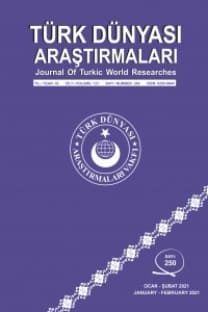AZERBAYCAN’IN PANDEMİ SONRASI EKONOMİK KALKINMA PERSPEKTİFİ
Çalışmada Azerbaycan’ın pandemi sonrası ekonomik kalkınma perspektifi analiz edilmektedir. Analiz, ağırlıklı olarak modern ekonomik büyüme teorisinin ortaya koyduğu ekonomik büyümenin temel nedenleri olan fiziki sermaye, beşeri sermaye ve teknolojideki gelişmelere odaklanmaktadır. Literatür taraması, ilgili küresel sırlamalar ve istatistik verilerin incelenmesi ve yorumlanmasına olanak tanıyan nitel araştırma ve karşılaştırmalı analiz yöntemlerinin uygulandığı çalışmanın sonuçları, Azerbaycan ekonomisinin hala üretkenliğe ve yeniliğe dayalı bir ekonomi değil, doğal kaynaklara, katma değeri düşük ürünlerin üretimine ve ihracatına dayalı ve yeterince çeşitlendirilmemiş bir ekonomi olarak kaldığını göstermektedir. Böyle bir yapıya sahip ekonominin ise pandemi sonrası dönemde de dış şoklara karşı kırılgan olacağı öngörülmektedir. Bu nedenle, Azerbaycan’ın ekonomik büyümenin yeni itici güçleri ve kaynakları üzerinde arayışını yoğunlaştırması önemlidir. Özellikle tarıma dayalı sanayi, petrokimya ve diğer doğal kaynaklara dayalı sanayi, nakliye ve lojistik hizmetleri, bilgi ve iletişim teknolojisi hizmetleri ve turizm gibi sektörler ülkede ekonomik büyümenin yeni itici güçleri olabilir. Fakat, tüm bu olanaklardan verimli bir şekilde yararlanmak için özellikle Azerbaycan gibi küçük ekonomilerin başlıca kalkınma talebi olan ihracata yönelik ekonomik büyüme modeline geçişin sağlanması, iyi çalışan ekonomik kurumlar ve yönetim sistemleriyle girişimciliğin, bilhassa küçük ve orta boy işletmelerin gelişimini sağlayacak elverişli girişimcilik ortamının oluşturulması büyük önem taşımaktadır.
Anahtar Kelimeler:
Azerbaycan ekonomisi, pandemi sonrası, ekonomik kalkınma, ekonomik büyüme
___
- ACEMOGLU, Daron: Introduction to Modern Economic Growth. Princeton University Press, 2009.
- ANTINYAN, Armenak; CORAZZINI, Luca: Relative Standing and Temporary Migration: Empirical Evidence from the South Caucasus. Liuc Papers n. 293, Serie Economia e Impresa 79, Marzo, 2016.
- ADB: Good Jobs for Inclusive Growth in Central Asia and the South Caucasus, © 2019 Asian Development Bank, October 2019.
- ADB: Azerbaijan: moving toward more diversified, resilient, and inclusive development, Manila, August, © Asian Development Bank, 2020.
- BAGIRZADEH, Elshan; SULEYMANOV, Turan: “The Contribution of Higher Education Institutions to Economic Development in Post-Soviet Countries: The Case of Azerbaijan”, People, Power, and Politics in Post-Pandemic World Order, Edited by Ahmet Gökbel, Erman Akıllı and Burak Güneş, Cambridge Scholars Publishing, April 2023, pp.124-143
- BIGOS, Krystian; WACH, Krzysztof: “Product Innovation as the Cause of Export Propensity in the Caucasus: Empirical Evidence for Armenia, Azerbaijan and Georgia”, Central Asia and the Caucasus, English Edition, Journal of Social and Political Studies, Volume 22, Issue 2, 2021, pp. 90-100.
- BROWNBRIDGE, Martin; CANAGARAJAH, Sudharshan: Migration and Remittances in the Former Soviet Union Countries of Central Asia and the South Caucasus: What Are the Long-Term Macroeconomic Consequences? World Bank Group Europe and Central Asia Region, Policy Research Working Paper 9111, January 2020.
- DAS, Gouranga et.al: “Key binding constraints, structural reform, and growth potential of Azerbaijan via economic diversification: A computable general equilibrium policy impact analysis”, Journal of Eurasian Studies, 2022, Vol. 13 (2) 119-144.
- EBRD: Azerbaijan Diagnostic, London, March 2019.
- EBRD: Transition Report 2021-2022, London, November 2021.
- EBRD: Transition Report 2022-2023, London, November 2022.
- EIU: Azerbaijan Country Report, London, April 2022.
- GIGAURI, Iza; DAMENIA, Nino: “Economic Expectations of the Belt and Road Initiative for the South Caucasus, with Emphasis on Georgia”, Business and Economic Research, Vol. 9, No. 1, 2019, pp. 173-199.
- GULIYEV, Nijat: The Effects of External Shocks on Azerbaijan Economy, Central Bank of the Republic of Azerbaijan, Working Paper Series, No. 02/2018, 2018.
- MAJIDLI Famil: The effects of oil prices and oil production on non-oil exports in an oil-rich country : the case of dutch disease symptom in Azerbaijan, International Journal of Energy Economics and Policy 12 (3), 2022, pp. 32 - 40.
- MURADOV, Edalet; BAGIRZADE, Elsen: Azerbaycan iqtisadiyyatı (infoqrafika), Baki: Serq-Qerb nesriyyati, 2021.
- NIFTIYEV, Ibrahim: Dutch Disease-Led De-Industrialization in the Azerbaijan’s Economy: Analysis of the Chemicals Industry, PhD Dissertation, Universıty of Szeged, Faculty of Economics and Business Administration Doctoral School in Economics, Szeged, 2022.
- RATHA, Dilip; KIM, Eung Ju: Russia-Ukraine Conflict: Implications for Remittance flows to Ukraine and Central Asia, KNOMAD, Policy Brief 17, March 4, 2022.
- SAFARLI, Uzeyir: Empiricial Analysis of the Dutch Disease in Azerbaijan’s Economy, Master Thesis, the Graduate School of Social Science of Middle East Technical University, Ankara, 2022.
- SAHA, David et.al: The economic effect of a resolution of the Nagorno-Karabakh conflict on Armenia and Azerbaijan, 15 June, © 2018 BE Berlin Economics GmbH., 2018.
- SCHUHBERT, Arne; THEES, Hannes: “Of routes and corridors: Challenges and opportunities for Silk Road destinations in the southern Caucasus”, Journal of Tourism, Heritage & Services Marketing, Vol. 62, 2020, pp. 21- 29.
- THE REPUBLIC OF AZERBAIJAN: Azerbaijan 2030: National Priorities of Socio-Economic Development, 02 February 2021, (Çevrim içi) https://president.az/en/articles/view/50474, 14 Nisan 2023.
- UNECE: Sub-regional Innovation Policy Outlook 2020: Eastern Europe and the South Caucasus, New York: United Nations, 2021.
- VALIZADA, Huseyn: Effects of Dutch Disease on the Economy of Azerbaijan, Master Thesis, Szegedi Tudományegyetem, 2021.
- WORLD BANK: Azerbaijan: The Role of Higher Education in Innovation, © World Bank, 2018.
- WORLD ECONOMICS: Azerbaijan’s Informal Economy Size, Quarterly Informal Economy Survey (QIES), London, 2022, (Çevrim içi) https://www.worldeconomics.com/Informal-Economy/Azerbaijan.aspx, 14 Nisan 2023.
- ZULFIGAROV, Farid; NEUENKIRCH, Matthias: “The Impact of Oil Price Changes on Selected Macroeconomic Indicators in Azerbaijan”, Economic Systems 44 (2020) 100814, 2020, pp. 1-13.
- YUSİFSOY, Aytek; OZSUER, Esra: “Evaluation on the Return Motivation of People that Exposed to Internal Migration in Azerbaijan” [in Turkish], Vakanuvis-Uluslararası Tarih Araştırmaları Dergisi, 7 (1), 2022, pp. 467-510
- ISSN: 0255-0644
- Başlangıç: 1979
- Yayıncı: Türk Dünyası Araştırmaları Vakfı
Sayıdaki Diğer Makaleler
ASKERİ GÜCÜN DOĞRU KULLANIMINA DAİR TÜRK VAKA ÇALIŞMASI: TÜRKİYE-AZERBAYCAN STRATEJİK ORTAKLIĞI
AZERBAYCAN HALK CUMHURİYETİ DÖNEMİNDEKİ ŞUŞA OLAYLARI: AZERBAYCAN GAZETESİNİN MALZEMELERİNE GÖRE
DAĞLIK KARABAĞ UYUŞMAZLIĞI ÖRNEĞİNDE ERMENİ SALDIRGANLIĞININ İÇYAPISAL NEDENLERİ
AZERBAYCAN VE TÜRKİYE TÜRKÇESİNDE RENK ADLARIYLA KURULAN BİTKİ ADLARI ÜZERİNE
Hatice ŞAHİN, Ramila TAKHİROVA
AZERBAYCAN’IN PANDEMİ SONRASI EKONOMİK KALKINMA PERSPEKTİFİ
II. KARABAĞ SAVAŞI SÜRECİNDE RUS MEDYASINDA ERDOĞAN VE TÜRKİYE
